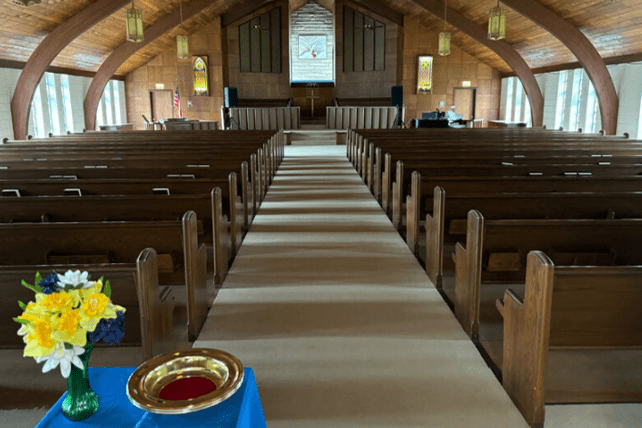MOUNT VERNON, Ill. (RNS) — First Baptist Church survived a tornado, church schisms and a pair of worldwide pandemics in its more than a century and a half of ministry in this small Southern Illinois town, about an hour east of St. Louis.
For 156 years, church members gathered to sing hymns, study the Bible and lift each other in prayer. They also ate barbecue, laughed, cried, reached out to their neighbors and cared for one another.
But nothing lasts forever.
“There is a time for everything,” Ryan Burge, pastor of First Baptist, told his congregation on Sunday (July 21) as they gathered for the church’s final worship service, reading from the book of Ecclesiastes. “A time for birth and a time for death. A time to build up and a time to tear down.”
For First Baptist, time had run out.
“After being a fixture of Mount Vernon for 156 years, First Baptist Church will no longer exist in the very near future,” Burge told the three-dozen or so worshippers. “And we are all deeply grieved for that moment. It will change our lives, in both big and small ways in the days and weeks to come.”
The church’s closing was made official a few minutes later during a brief congregational meeting after the service, when church members voted to close as of Aug. 1. It was a decision that followed years of slow decline.
In the late 1990s, the church had about 170 members, down from more than 600 members in the 1960s but still a going concern. By the mid-aughts, when Burge arrived as a 20-something pastor, the church had about 50 members. At closing, there were fewer than 20.
The decline of First Baptist followed a larger pattern among churches in the United States, where the average congregation’s size has shrunk from 137 in 1999 to less than 60 today, according to the Faith Communities Today study. Meanwhile, most people if they attend services go to a larger congregation.
That pattern has played out in Mount Vernon, where small churches like First Baptist have struggled. First Presbyterian Church, for example, shares space with the local Lutheran congregation, while its former building is now a YMCA. Meanwhile, about a mile south of First Baptist, Central Christian, a non-denominational multi-site congregation, is thriving.
Gail Farnham, who as moderator at First Baptist led the meeting’s vote, said small churches like First Baptist are stuck in a dilemma. They can’t attract people with the same kinds of programs that larger churches offer. As a congregation ages, most of the people they know, if they are interested in going to church, already have a place to worship.
Farnham said she had been preparing for the reality of closing the church for years. In 2017, the church gave its building to a local Christian school, with the caveat that the congregation could still meet in the building for worship. That decision, she said, gave the church a few more years of life. It also ensured the building would still be used for ministry even after First Baptist was closed.
She was pleased to see old friends show up for the church’s last service and the congregation’s last time together.
“I don’t feel sad right now,” said the 80-year-old Farnham, who first came to First Baptist, which is part of the American Baptist Churches USA, with her family when she was about 5 years old. “I just feel like it’s happening the way it should happen.”
Tens of thousands of local congregations like First Baptist are likely to close over the next few decades if current trends continue. Their passing will go unnoticed, said Burge, a political science professor at Eastern Illinois University who studies the changing religious landscape.
Burge said that even as the congregation at First Baptist shrank, members were still active in serving their community. From 2008 to 2023, the church provided nearly 55,000 lunches for local schools, with elderly members showing up to volunteer to fill the lunch bags. That dedication renewed his faith, said Burge.
“When I believed in God the most is when the two dozen people assembled (here) heard about the idea of the Brown Bag Program and did not hesitate to get involved,” he said in his final sermon, “when I saw members who struggled to stand do everything that they could to help pack those bags; when people gave over and above their tithe to make sure that we always had enough items to feed those hungry kids.”
Burge has long championed the importance of organized religion, for both its spiritual and social benefits. Churches, he argues, host food pantries and shelters, volunteer for disaster relief and provide small acts of kindness that make the world less awful. They care for one another when life gets hard.
That’s something he experienced firsthand growing up. His family struggled to make ends meet, and he recalls boxes of groceries showing up on the family’s porch, provided by members of their church who wanted to lend a hand. Without that care, he wonders if his family would have made it through those hard times.

